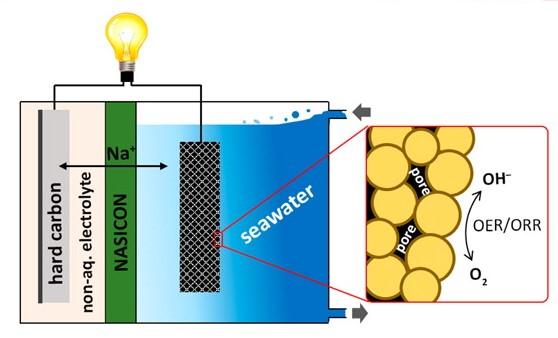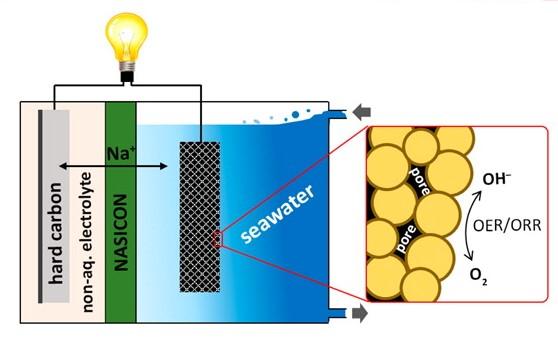
Scientists have developed a battery that uses seawater as the catholyte.
Click for a high-resolution image…. view more
Credit: American Chemical Society
With the ubiquity of lithium-ion batteries in smartphones and other rechargeable devices, it's hard to imagine replacing them. But the rising price of lithium has spurred a search for alternatives. One up-and-coming battery technology uses abundant, readily available seawater. Now, making this option viable is one step closer with a new report on a sodium-air, seawater battery. The study appears in the journal ACS Applied Materials & Interfaces.
Sodium-air — or sodium-oxygen — batteries are considered one of the most promising, and cost-effective alternatives to today's lithium-ion standby. But some challenges remain before they can become a commercial reality. Soo Min Hwang, Youngsik Kim and colleagues have been tackling these challenges, using seawater as the catholyte — an electrolyte and cathode combined. In batteries, the electrolyte is the component that allows an electrical charge to flow between the cathode and anode. A constant flow of seawater into and out of the battery provides the sodium ions and water responsible for producing a charge. The reactions have been sluggish, however, so the researchers wanted to find a way to speed them up.
For their new battery, the team prepared a catalyst using porous cobalt manganese oxide nanoparticles. The pores create a large surface area for encouraging the electrochemical reactions needed to produce a charge. A hard carbon electrode served as the anode. The resulting battery performed efficiently over 100 cycles with an average discharge voltage of about 2.7 volts. This doesn't yet measure up to a lithium-ion cell, which can reach 3.6 to 4.0 volts, but the advance is getting close to bridging the gap, the researchers say.
###
The authors acknowledge funding from the Ulsan National Institute of Science and Technology (Republic of Korea).
The abstract that accompanies this study is available here.
The American Chemical Society is a nonprofit organization chartered by the U.S. Congress. With nearly 157,000 members, ACS is the world's largest scientific society and a global leader in providing access to chemistry-related research through its multiple databases, peer-reviewed journals and scientific conferences. Its main offices are in Washington, D.C., and Columbus, Ohio.
To automatically receive news releases from the American Chemical Society, contact [email protected].
Follow us: Twitter Facebook
Media Contact
Michael Bernstein
[email protected]
202-872-6042
@ACSpressroom
http://www.acs.org
############
Story Source: Materials provided by Scienmag





